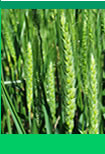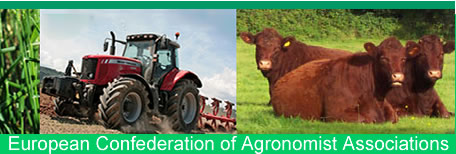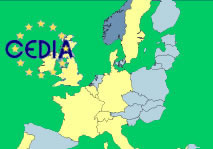


|
Historical Background The roots of the first CEDIA go back to contacts between agronomists of the large European countries, founders of the EEC, in the framework of their activities in Brussels. The Common Agricultural Policy (CAP), which is one of the cornerstones on which the European Union is built, had resulted in many Agronomists being resident in the Belgian capital. Even more, all the nationalities of the first club of six, had, and still have an agronomist association / liaison group in Brussels. The Germans, French and Italians created the first European Agronomist Association in June 1987. Its original name was: The European Committee of Agronomists. In the beginning, this association had a status similar to that of ICA (Interfaculty Consortium for Agricultural and related sciences in Europe) at that time - an appendix to CEPFAR (The European promotion and training centre for the rural population). In fact it was an informal association with no legal status. From its beginning, CEDIA always favoured the development of direct contacts among Community Agronomists, not only in Brussels but also in European member countries and associated countries. Although the
awareness of “ local “ populations, of European decisions,
taken in Brussels, has increased significantly in the last decade,
involvement in the European way of thinking and in European integration
is still a big concern. In Oct 1996, in Copenhagen, the European Association of Agronomists changed its name to that of Cedia “The European Confederation of Agronomist Associations”; adopted a constitution and expanded its role. The adaptation of a constitution and statutes conferred on the Association the status of a legal Non Profit Association. This strengthened the organisational basis of the Association and gave it legal recognition and status. It also gave it the potential to develop its activities, have a bank account, participate in certain community programmes, and set up its own secretariat. Cedia has since, further expanded its horizons, by recently becoming a member of AIMA –The World Organisation of Agronomists Associations. During the past years representatives from the following countries have served as President and chaired the CEDIA board respectively: - Denmark (B. Östegard), Germany (Ms C. Volkinsveld), France (J. Herblot), Belgium (W. Ryon), France (Paul Deram), Portugal (Alberto Krohn de Silva). Sean Gaule from Ireland is currently the President of Cedia and chairs the board meetings. Thanks to the financial and other support of Member Associations and of the European Commission, CEDIA has been able to organise a number of International Conferences, seminars and other events on subjects of particular interest to its members. In addition to a number Cedia/ ICA joint conferences study visits were also organised by Cedia in conjunction with member associations, very often to co inside with major agricultural events in that particular country. CEDIA also carried out various examinations and studies on the situation of the Agronomist in the various member States - among the most important items considered were statutory / legal situation, training, employment opportunities etc. Other points of interest were the structure of the national or regional agronomist associations and their number and conditions for membership. Questions about their principal fields of professional activity and about the remuneration were also included. A current study in progress will provide up to date information on the present situation. In order to address a crisis in employment for agronomists, which was quite severe a number of years ago, in some parts of Europe, CEDIA launched, with the financial aid of the Commission, the ATTEA (Agro Technology Transfer by European Agronomists) project. The aim was to provide the opportunity for young graduates to participate in a remunerated temporary position of six to twelve months in another European country. International experience continues to be promoted by Cedia not, alone does it provoke a technology transfer between the regions concerned but it also allows for the development of international knowledge and inter–cultural and communication skills which stimulate international business and development. In 1994, CEDIA wrote the Charter for the European Agronomist. This document, which sets out some basic principles, is still most relevant today. It explains the ethical responsibilities and duties of every agronomist. These are focused on a number of important issues of direct relevance to mankind: production, both quantitatively and qualitatively, of food for a growing world population and on the respect for the environment and natural resources, energy requirements and climate change. With continued globalisation and the enlargement of the EU to include Central and East European countries, these issues have become even more important. Most of these latter member states and candidates countries have a large agricultural potential, a lot can to be done to improve production, to preserve resources and to enhance rural development. For CEDIA the expansion of its membership to include representation from these countries as well as extending its horizons to participation on the world stage of agronomists by way of membership of AIMA is now a major priority. Another file also preoccupies Cedia. It is that of curriculum development and of the studies, which lead to our degrees and qualifications. Recent declarations of political and university leaders oblige us to be extremely alert towards the quality of the future of our education and training of our profession. In this regard co-operation and collaboration with other professional associations is regarded as being most important. Over 20 years of CEDIA activity has proven the need for an agreed and coordinated approach - a real European platform for our members and member associations. We have had many common issues, demands and duties, the solution to many of which, were found through organised international collaboration. |